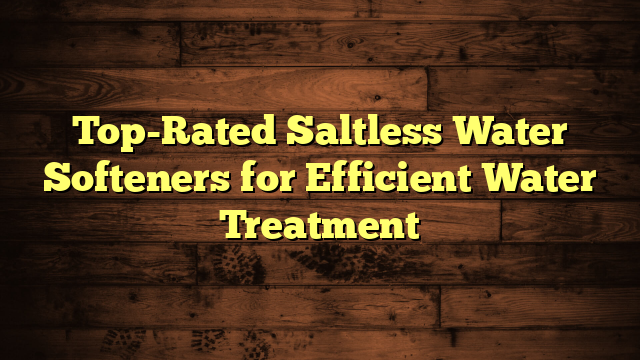Eddy Vs Salt Water Softner
Like the age-old debate between the tortoise and the hare, the choice between Eddy water conditioners and salt water softeners presents a unique dilemma for homeowners facing hard water issues. You might find yourself weighing the ease of installation and maintenance in Eddy systems against the consistent results provided by salt softeners. Each solution has its strengths and weaknesses, leaving you to ponder which aligns best with your specific needs. The implications of this choice could greatly impact your household, so it's worth considering the nuances of both systems.
Key Takeaways
- Eddy conditioners utilize electromagnetic fields to alter mineral properties, while salt softeners replace hard minerals with sodium ions through ion exchange.
- Eddy systems require no salt or chemicals, making them more environmentally friendly than salt water softeners, which can harm local ecosystems.
- Installation of Eddy conditioners is easier and often requires no professional help, while salt softeners may need professional installation and regular maintenance.
- Salt water softeners provide consistent softening results, especially in very hard water areas, while Eddy conditioners may show variable effectiveness in such conditions.
- Maintenance for Eddy conditioners is minimal, while salt softeners require regular salt refills and cleaning to maintain performance.
Overview of Eddy Water Conditioners
Eddy Water Conditioners offer a unique approach to tackling hard water issues without the need for salt or chemicals. With Eddy technology, you can enjoy effective water conditioning that's easy to install and maintain.
Unlike traditional systems, Eddy conditioners use electromagnetic fields to alter the properties of hard water, preventing scale buildup on your pipes and appliances.
When you choose Eddy, you're opting for an environmentally friendly solution. There's no need for salt, which means you won't have to worry about the negative impacts on your garden or the local ecosystem.
The system operates quietly and efficiently, fitting seamlessly into your home's plumbing without requiring extensive modifications.
You'll find that Eddy conditioners are suitable for various applications, from residential homes to small businesses. Their effectiveness against hard water minerals like calcium and magnesium makes them a practical choice for many.
Plus, the long-lasting benefits of reduced scale can save you money on repairs and maintenance over time.
Overview of Salt Water Softeners
Salt water softeners work by replacing hard minerals in your water with sodium ions, making it easier on your plumbing and appliances.
You'll appreciate the advantages of softened water, such as improved taste and less soap scum, but it's also important to evaluate the environmental impact of using these systems.
Understanding these aspects can help you decide if a salt water softener is the right choice for your home.
Functionality of Salt Softeners
When it comes to tackling hard water issues, salt water softeners play an essential role in improving water quality. These systems primarily work through a process called ion exchange. During this process, the hard minerals in your water—like calcium and magnesium—are replaced with sodium ions. This exchange notably reduces the hardness of your water, leading to a more efficient plumbing system and better cleaning results.
To understand the key aspects of salt water softeners, here's a quick overview:
| Feature | Description | Importance |
|---|---|---|
| Salt Efficiency | Measures how effectively salt is used | Affects operating costs |
| Maintenance Requirements | Frequency of salt refills and cleaning | Guarantees long-term functionality |
| Water Flow Rate | Speed at which softened water is delivered | Impacts daily water usage |
| System Lifespan | Average duration before replacement | Indicates overall value |
| Cost to Operate | Monthly expenses for salt and maintenance | Affects budget considerations |
Advantages of Softened Water
While you mightn't realize it, softened water can considerably enhance your daily life. One of the primary softened water benefits is that it prevents mineral buildup in your plumbing and appliances. This means fewer repairs and replacements, leading to significant cost savings in the long run.
You'll notice that your faucets and showerheads stay cleaner, and your appliances like dishwashers and water heaters operate more efficiently.
Another household advantage is the improved lathering capability of soaps and shampoos. You'll find that your skin feels softer and your hair shinier after washing, as softened water allows these products to work more effectively.
Additionally, softened water can reduce the amount of detergent needed for laundry, which translates to savings on cleaning products. You'll also appreciate that your clothes may last longer due to reduced wear and tear from hard water minerals.
In short, investing in a salt water softener brings a range of softened water benefits that enhance your home and lifestyle.
From appliance longevity to better personal care, the advantages are clear. You'll enjoy a more efficient and pleasant living environment, making it well worth considering.
Environmental Impact Considerations
Considering the environmental impact of salt water softeners is essential for homeowners looking to improve their water quality. While these systems effectively reduce hard water issues, they also raise sustainability concerns and ecological effects that you should consider.
- Salt runoff: When you regenerate the softener, excess salt can enter local water systems, harming aquatic life.
- Soil degradation: High salt levels can lead to soil salinization, making it difficult for plants to absorb water and nutrients.
- Energy consumption: The process of creating and transporting salt has a carbon footprint, increasing your overall environmental impact.
It's important to weigh these factors against the benefits of softened water.
If you're committed to sustainability, you might want to explore alternative solutions like the Eddy water conditioner, which doesn't use salt and has a markedly lower ecological footprint.
Ultimately, understanding the broader implications of salt water softeners can help you make a more informed decision for both your home and the environment.
How Eddy Works
Eddy uses advanced electromagnetic technology to treat hard water, making it more manageable for your home. This innovative method employs Eddy technology, which generates magnetic fields that alter the properties of minerals present in hard water.
When water flows through the system, these magnetic fields affect the way calcium and magnesium ions behave, reducing their ability to form scale and buildup in your plumbing and appliances.
You might be wondering how this works in practical terms. As the water passes through the Eddy unit, the magnetic fields create a physical change in the mineral particles, causing them to remain suspended in the water rather than settling as scale.
This process not only helps reduce limescale formation but also enhances the effectiveness of soaps and detergents, leading to cleaner dishes and brighter laundry.
Unlike traditional water softeners that use salt, Eddy technology doesn't require additives, making it an eco-friendly choice.
You'll appreciate the simplicity of installation and maintenance, along with the benefits of softened water throughout your home.
In short, Eddy provides an efficient solution to hard water issues without the downsides of chemical treatments.
How Salt Water Softeners Work
Salt water softeners use a process called ion exchange to tackle hard water problems.
When hard water passes through the softener, calcium and magnesium ions are swapped for sodium ions, which helps to reduce scale buildup in your plumbing.
After a while, the softener needs to regenerate, flushing out the accumulated hardness minerals and refilling with sodium, ensuring it keeps working efficiently.
Ion Exchange Process
A salt water softener operates through a process called ion exchange, which effectively removes hard minerals like calcium and magnesium from your water. This process is essential in combating water hardness and improving your water quality.
Here's how it works:
- Ion Exchange Resin: The softener contains resin beads that are charged with sodium ions.
- Mineral Removal: As hard water flows through the resin, calcium and magnesium ions swap places with the sodium ions.
- Soft Water Output: The result is softened water, free from the minerals that cause scaling and buildup.
When you turn on your tap, the softened water flows through your plumbing, making a noticeable difference in your daily activities, like washing dishes or taking a shower.
This simple yet effective method not only improves the taste of your water but also extends the lifespan of your appliances.
Regeneration Cycle Explained
The regeneration cycle is a crucial aspect of how salt water softeners maintain their effectiveness in treating hard water. During this process, the softener cleans its resin beads, allowing them to effectively remove hardness minerals like calcium and magnesium. You'll often find that the regeneration frequency varies based on your water usage and hardness levels.
Here's a quick breakdown of the regeneration process:
| Step | Description |
|---|---|
| 1. Backwash | The system flushes out debris and sediment. |
| 2. Brine Draw | Saltwater solution flows through the resin beads. |
| 3. Rinse | The resin is rinsed to remove excess salt. |
| 4. Refill | The tank refills with fresh water. |
| 5. Standby | The system resets, ready for the next cycle. |
Understanding this cycle helps you appreciate the efficiency of your softener. Regular regeneration guarantees that your system continues to work efficiently, providing you with soft water for your home. So, keep an eye on your system's regeneration frequency to maintain its performance and prolong its lifespan.
Benefits of Eddy Conditioners
While many homeowners seek effective solutions for hard water issues, Eddy conditioners offer a range of benefits that make them a compelling choice. With their unique approach to water conditioning, you'll find that they can improve your water quality without the drawbacks of traditional salt-based systems.
Here are some key advantages:
- Eddy Effectiveness: These conditioners work by altering the properties of hard water, reducing scale buildup and improving the efficiency of water-using appliances.
- Eddy Installation: Installing an Eddy conditioner is a breeze; you won't need any special tools or plumbing expertise, allowing you to set it up quickly and easily.
- Environmentally Friendly: Unlike salt softeners, Eddy conditioners don't add chemicals to your water, making them a safer choice for your family and the environment.
Choosing an Eddy conditioner means you can enjoy softer water without the hassle of maintenance or the need for salt refills.
The benefits extend beyond just convenience; you'll notice improved appliance longevity and better skin and hair health, too.
Benefits of Salt Water Softeners
Salt water softeners offer a tried-and-true method for tackling hard water issues, providing a reliable solution for many households. They work by removing calcium and magnesium ions from your water, giving you softer water that can make a noticeable difference in your daily life. With salt efficiency being a key factor, these systems guarantee that you use just the right amount of salt for ideal performance, minimizing waste.
Here's a quick look at some benefits of salt water softeners:
| Benefit | Description |
|---|---|
| Improved appliance lifespan | Softened water helps prevent scale buildup, extending the life of your appliances. |
| Lower maintenance costs | Fewer repairs and replacements mean you save money over time. |
| Softer skin and hair | Enjoy the benefits of softer water for healthier skin and hair. |
| Better cleaning results | Salt water softeners enhance soap lather, making cleaning more effective. |
Drawbacks of Each System
Considering the drawbacks of both Eddy and salt water softeners is essential for making an informed decision about which system suits your needs. Each has its shortcomings that may affect your choice.
- Eddy efficiency can vary, and some users report inconsistent results, especially in areas with very hard water.
- Salt maintenance can be demanding, as you'll need to regularly refill the salt supply and occasionally clean the brine tank.
- Both systems may require professional installation, which can add to your initial costs.
While the Eddy system boasts low maintenance and no salt, its effectiveness isn't universally guaranteed. You might find it less effective in extremely hard water conditions, leading to potential dissatisfaction.
On the other hand, salt water softeners often result in softened water that can be more predictable, but they also create salty discharge, raising environmental concerns.
Knowing these drawbacks helps you weigh your options wisely. By understanding the limitations of each system, you can select the water softener that aligns best with your household's needs and your lifestyle preferences.
Choosing the Right Solution
With a clear understanding of the drawbacks of both systems, you're now ready to choose the right solution for your home.
First, consider your installation requirements. Eddy systems typically require less space and are easier to install, often needing just a few hours of work. On the other hand, salt water softeners may involve more extensive plumbing adjustments, especially if you have a larger system.
Next, think about the maintenance requirements. Eddy systems are relatively low-maintenance, requiring minimal upkeep aside from occasional checks. In contrast, salt water softeners demand regular salt refills and periodic cleaning, which can be a hassle if you're busy.
You should also evaluate your water quality needs. If your water has heavy hardness, a salt water softener might be more effective. However, if you're looking for an eco-friendlier option, the Eddy system could be the way to go.
Ultimately, weigh these factors against your lifestyle and budget.
Take the time to assess how much effort you want to invest in installation and maintenance before making your final decision.
Whatever you choose, ensuring clean, soft water is a goal worth pursuing.
Frequently Asked Questions
How Long Does It Take to Install an Eddy Conditioner?
Eddy installation time is quick, usually taking just a couple of hours. Once installed, you'll enjoy benefits like reduced scale buildup and improved water quality, making it a smart choice for your home.
Can I Use an Eddy Conditioner With Existing Plumbing?
You can definitely use an Eddy conditioner with your existing plumbing. Its compatibility with various setups makes installation a breeze. Just make certain your plumbing requirements align, and you'll enjoy softened water in no time!
Are There Any Specific Maintenance Requirements for Eddy Systems?
Eddy systems require minimal maintenance. You should regularly check connections and guarantee the unit's clean. Following these maintenance tips helps maintain efficiency and prolong the system's lifespan, guaranteeing peak performance for your water conditioning needs.
What Is the Lifespan of a Salt Water Softener?
Think of a salt water softener like a trusty steed. With proper maintenance tips, you can expect a salt softener lifespan of 10 to 15 years. Regular checks guarantee it stays reliable and efficient for you.
How Do I Know if My Water Is Hard Enough for Treatment?
To know if your water's hard enough for treatment, conduct water hardness testing. If you find high mineral levels, you'll enjoy the benefits of treatment, including softer skin and improved appliance efficiency.
Conclusion
In choosing between Eddy water conditioners and salt water softeners, consider your specific needs. Eddy conditioners offer ease of installation and minimal maintenance, while salt softeners provide reliable results for severe hardness. Both systems have their advantages and drawbacks; it's about what fits your lifestyle best. Ultimately, whether you prioritize eco-friendliness or consistent performance, understanding these options empowers you to make an informed decision for your home's water quality. Choose wisely, and enjoy better water!







